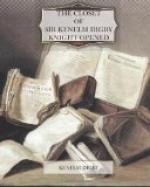With a distinctly rationalistic temper, he was yet a faithful, if independent, son of the Roman Church. He speaks sometimes as if he regarded the Church as the great storehouse of necessary authority for the intellectually feeble; but he accepted the main dogmas himself, being satisfied of them by intuition and reason. Protestantism, he held, was not for the ordinary person, considering “the natural imbecility of man’s wits and understandings.” His piety was a thing apart, a matter of heredity perhaps, and of his poetic temperament. I have heard him called by that abused name, “mystic.” He was nothing of the sort, and he said so in memorable words. As an act of devotion he translated the Adhering to God of Albertus Magnus. In the dedication to his mother he compares himself, as the translator of this mystic treatise, to certain travellers who “speak upon hearsay of countries they were never in.” “The various course in the world that I have runne myself out of breath in, hath afforded me little means for solid recollection.” Yet was he now and then upon the threshold. With streaks of the quack and adventurer in him, he gave out deep notes. Says Lloyd: “His soul [was] one of those few souls that understand themselves.”
With an itch to use his pen as well as his tongue, he had none of the patience, the hankering after perfection of form, of the professional man of letters. His account of his Scanderoon exploit, a sea-log, a little written-up later, was perhaps not meant for publication. It did not see the light till 1868. His Memoirs were written, he says, “for my own recreation, and then continued and since preserved only for my own private content—to please myself in looking back upon my past and sweet errors.” He even begs those who may come upon the MS. “to convert these blotted sheets into a clear flame.” His commentary on the Faery Queen stanza was thrown off in a hurry. “The same Discourse I made upon it the first half quarter of an hour that I saw it, I send you there, without having reduced it to any better form, or added anything at all to it.” And so for the better-known and interesting Observations on ’Religio Medici.’ Browne reproached him for his review of a pirated edition. Digby replied he had never authorised its publication, written as it was in twenty-four hours, which included his procuring and reading the book—a truly marvellous tour de force; for the thing is still worth perusal. He was always the improvisor—ready, brilliant, vivid, imperfect. He must give vent to the ideas that came upon him in gusts. “The impressions which creatures make upon me,” he says, “are like boisterous winds.” He fully recognised his own limitations. “I pretend not to learning,” he declares, with exaggerated modesty. Amateur and improviser of genius, let us praise him as such. The spacious, generous minds that can find room for all the ideas and culture of an epoch are never numerous enough. There is




